List of amphibians and reptiles of Anguilla
This is a list of amphibians and reptiles found in the British overseas territory of Anguilla, located in the Lesser Antilles chain in the Caribbean. It comprises the main island of Anguilla, and many much smaller islands and cays that have no permanent human population.
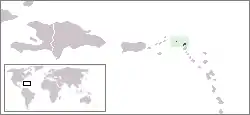
Location of Anguilla in the Caribbean
Amphibians
There are two species of amphibian on Anguilla, both of which were introduced.
Frogs (Anura)
| Tree frogs (Hylidae) | |||
|---|---|---|---|
| Species | Common name(s) | Notes | Image |
| Osteopilus septentrionalis | Cuban tree frog | Least Concern.[1] Recently introduced, mostly through shipping containers; now "firmly established" on Anguilla.[2] | 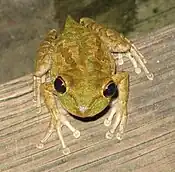 |
| Tropical frogs (Leptodactylidae) | |||
| Species | Common name(s) | Notes | Image |
| Eleutherodactylus johnstonei | Lesser Antillean whistling frog, coqui Antillano, Johnstone's whistling frog | Least Concern. Recently introduced. | 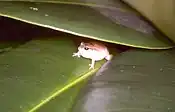 |
Reptiles
Including marine turtles and introduced species, there are 19 reptile species reported on Anguilla. Two are endemic and are restricted to small, uninhabited satellite islands: Censky's Ameiva (Pholidoscelis corax) and the Sombrero Ameiva (Pholidoscelis corvina).
Turtles (Testudines)
| Tortoises (Testudinidae) | |||
|---|---|---|---|
| Species | Common name(s) | Notes | Image |
| Geochelone carbonaria | Red-footed tortoise | 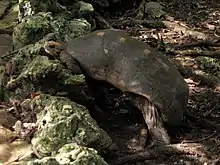 | |
| Scaly sea turtles (Cheloniidae) | |||
| Species | Common name(s) | Notes | Image |
| Caretta caretta | Loggerhead turtle | Endangered. No reliable reports of nesting in Anguilla.[3] | 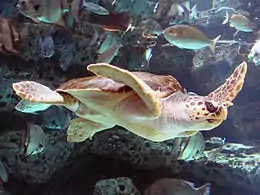 |
| Chelonia mydas | Green turtle | Endangered. Recorded nesting in Anguilla, principally on Dog Island and the Prickly Pear Cays. | 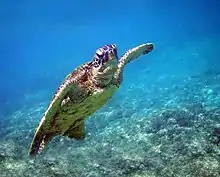 |
| Eretmochelys imbricata | Hawksbill turtle | Critically Endangered. The principal nesting turtle species in Anguilla, with important sites on the main island, Dog Island, and the Prickly Pear Cays. A year-round forager. | 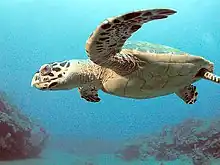 |
| Leathery sea turtles (Dermochelyidae) | |||
| Species | Common name(s) | Notes | Image |
| Dermochelys coriacea | Leatherback turtle | Critically Endangered. Rare in Anguilla. Recorded nesting on the main island and Scrub Island. | 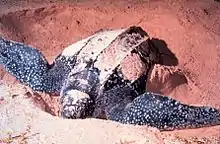 |
Lizards and snakes (Squamata)
| Geckos (Gekkonidae) | |||
|---|---|---|---|
| Species | Common name(s) | Notes | Image |
| Hemidactylus mabouia | House gecko | Introduced. | .jpg.webp) |
| Sphaerodactylus parvus | Regionally endemic. Highly abundant. Formerly described as subspecies of Sphaerodactylus macrolepis chiefly found in the Greater Antilles until elevated to species level in 2001.[4] | ||
| Sphaerodactylus sputator | Island least gecko | Regional endemic. Highly abundant. | 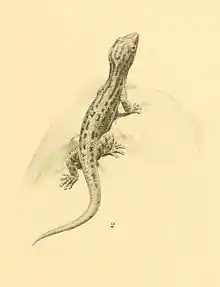 |
| Thecadactylus rapicauda | Turnip-tailed gecko | ||
| Iguanas and anolids (Iguanidae) | |||
| Species | Common name(s) | Notes | Image |
| Anolis carolinensis | Green anole, Carolina anole, red-throated anole, American anole, American chameleon | Recent introduction; native mainly to southeastern United States.[5] | 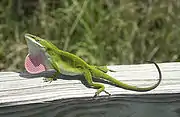 |
| Anolis gingivinus | Anguilla anole, Anguilla Bank anole | Regional endemic. Widespread and common on the main island and its satellites. | |
| Iguana delicatissima | Lesser Antillean iguana, West Indian iguana | Vulnerable. Regional endemic. Restricted to the Little Bay area. Only about 50 individuals were believed to remain on Anguilla in 1999.[6] | 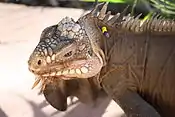 |
| Iguana iguana | Green iguana, common iguana | Colonized Anguilla due to either Hurricane Luis or Marilyn in 1995, by floating on natural rafts from Guadeloupe; has apparently since sustained a breeding population on Anguilla, possibly threatening the native I. delicatissima.[7] | 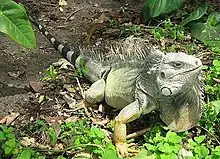 |
| Whiptails (Teiidae) | |||
| Species | Common name(s) | Notes | Image |
| Pholidoscelis corax | Censky's ameiva | Endemic. Restricted to the tiny islet of Little Scrub, off the coast of Scrub Island. | |
| Pholidoscelis corvina | Sombrero ameiva | Endemic. Restricted to Sombrero Island. | |
| Pholidoscelis plei | Anguilla Bank ameiva | Regional endemic. Common; found on the main island of Anguilla and most of its satellites. | 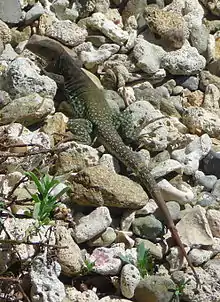 |
| Skinks (Scincidae) | |||
| Species | Common name(s) | Notes | Image |
| Mabuya mabouya[8] | Regional endemic. | 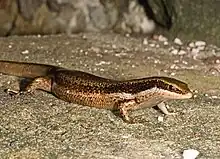 | |
| Worm snakes (Typhlopidae) | |||
| Species | Common name(s) | Notes | Image |
| Ramphotyphlops braminus | Brahminy blind snake, flowerpot blind snake | Presence on Anguilla recently discovered. Widely distributed in the tropics, but limited in the Lesser Antilles. | 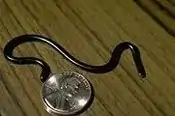 |
| Colubrids (Colubridae) | |||
| Species | Common name(s) | Notes | Image |
| Alsophis rijgersmaei | Leeward Island racer | Endangered. Regional endemic. Found on main island and Scrub Island. | |
Notes
- Conservation status, where available, is from the IUCN Red List and is indicative of the status of the species as a whole, not just populations on Anguilla.
- Townsend et al. 2000 describes sporadic sightings as early as the 1980s, but states that it was not entrenched until after 1999. Not recorded on Anguilla (or anywhere else in the Lesser Antilles) in Malhotra & Thorpe 1999.
- See Procter & Fleming 1999, p. 14 for a description of known sea turtle occurrence in Anguilla and its waters.
- Powell & Henderson 2005, p. 72.
- Powell & Henderson 2005, p. 70 (citing to Eaton, et al. (2001). Geographic distribution: Anolis carolinensis. Herpetol. Rev. 32:118). A. carolinensis is not reported in Malhotra & Thorpe 1999.
- Procter & Fleming 1999, p. 14.
- See Censky, Ellen J.; Hodge, Karim; Dudley, Judy (1998), "Over-water dispersal of lizards due to hurricanes", Nature, 395 (6702): 556, doi:10.1038/26886. Also reported in Yoon, Carol Kaesuk (8 October 1998), "Hapless Iguanas Float Away And Voyage Grips Biologists", The New York Times, retrieved 10 March 2010. This colonization is mentioned in Procter & Fleming 1999, p. 14, and in Malhotra & Thorpe 1999, p. 56, though I. iguana is not included in the species checklist for Anguilla.
- Though reported in Malhotra & Thorpe 1999 as M. bistriata, the Anguilla population has been reassigned.
References
Note: All species listed above are supported by Malhotra & Thorpe 1999, unless otherwise cited.
- Malhotra, Anita; Thorpe, Roger S. (1999), Reptiles & Amphibians of the Eastern Caribbean, Macmillan Education Ltd., pp. 52–56, ISBN 0-333-69141-5.
- Powell, Robert; Henderson, Robert W. (2005), "Conservation Status of Lesser Antillean Reptiles" (PDF), Iguana, 12 (2): 63–77
- Procter, D.; Fleming, L. V., eds. (1999), Biodiversity: The UK Overseas Territories (PDF), Joint Nature Conservation Committee, pp. 11–17, ISBN 1-86107-502-2
- Townsend, Josiah H.; Eaton, James M.; Powell, Robert; Parmerlee, Jr., John S.; Henderson, Robert W. (2000), "Cuban treefrogs (Osteopilus septentrionalis) in Anguilla, Lesser Antilles.", Caribbean Journal of Science, 36 (3–4): 326–328
This article is issued from Wikipedia. The text is licensed under Creative Commons - Attribution - Sharealike. Additional terms may apply for the media files.